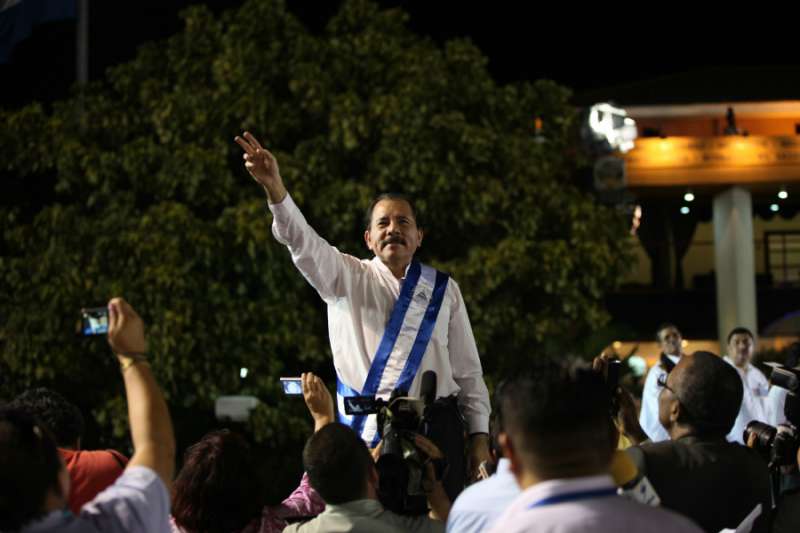The Nicaraguan bishops lamented Wednesday that “the Nicaraguan family continues to suffer,” and called for no more “repressive actions and persecution.”
Anti-government protests in Nicaragua began in April 2018. They resulted in more than 300 deaths, and the country’s bishops mediated on-again, off-again peace talks until they broke down in June. A new round of dialogue began in February.
In a May 1 message, the Nicaraguan bishops said that “our faith in Jesus Christ who died and rose again for our salvation does not allow us to remain on the sidelines of world events, and for us, the cultural, political, economic, familial and social situation in the country.”
“To selfishly close yourself up in your own comfort and still worse to stoke up feelings of hatred between brothers, is not the way of the Gospel,” they added.
The bishops' conference said that “the sufferings of the Nicaraguan family” are seen in “the political prisoners, the lack of respect for constitutional rights, those exiled, the refugees, those living in asylum, poverty, unemployment, lack of public safety, conflicts over land and their corresponding consequences, families from the western part of the country moving into the Caribbean coastal area, invading the fertile lands that the indigenous people have historically possessed.”
This problem, they noted, makes evident “that without the presence of God … we have no future.”
The bishops called on Nicaraguans to build a country “where we can be capable of achieving a vision of change that leads to a qualitative transformation.”
“We are called to build an integral concept of peace and, in that sense, to build up a society where peace will be lasting, just and consistent with the interests of all,” they said.
“The peace that comes down from the Crucified and Risen One who remains despite the ravages of time and is not the object of short-tern arrangements,” they added.
It is also necessary to work for “a Nicaragua where the centrality of the human person and his dignity as a child of God is upheld.”
“The exercise of freedom and the dignity of the human person are prior to the state. A state that is modern and functional, ethical and moral, has the obligation to protect, respect, promote and defend these rights, which are also prior any social accord,” they pointed out.
“It is then an imperative that in a society there not be any repressive actions or persecution, making possible a climate of unhindered freedom and trust.”
The bishops' conference then said that “democracy and its institutional dimension” must be respected and strengthened in Nicaragua, since “the life of a human being has meaning in the framework of democratic values, principles and institutions.”
“We must not forget that respect for a democracy must be inspired by the idea of strengthening the institutions and principles that the rule of law is founded on: the supremacy of the law, the separation of powers and respect for human rights.”
The bishops also said that “a Nicaragua where the freedom of expression is exercised without restrictions” must be built.
“Every principle of the freedom of expression has its origin in the maximum expression of God who freely expressed his love for humanity through the Incarnate Word,” they stated.
Peace must be “the fruit of justice,” they added. “In this time of crisis we Nicaraguans are called to establish accords in the matter of justice that will be lasting and that are respected.”
“In such a way that we support every initiative to dialogue made with good will and particularly the effort that the Holy See has been making through the several messages that Pope Francis has sent us, and the presence of the nuncio as a witness and international observer.”
The bishops stressed that “this is not a matter of looking for ways to evade the current situation but to face it stemming from communion with Christ. In the same way that the Resurrection is rooted in the night of the Cross so does the energy and joy of the Christian spring from communion with the sufferings of his Lord.”
“May the Queen of Heaven, who rejoiced at the resurrection of her Son, by participating in his sorrowful Passion, intercede for us and make us to to share in her joy,” they concluded.
Nicaragua’s crisis began last year after president Daniel Ortega announced social security and pension reforms. The changes were soon abandoned in the face of widespread, vocal opposition, but protests only intensified after more than 40 protestors were killed by security forces.
The pension reforms which triggered the unrest were modest, but protests quickly turned to Ortega’s authoritarian bent.
Ortega has been president of Nicaragua since 2007, and oversaw the abolition of presidential term limits in 2014.
The Church had suggested that elections, which are not scheduled until 2021, be held this year, but Ortega has ruled this out.
Ortega was a leader in the Sandinista National Liberation Front, which had ousted the Somoza dictatorship in 1979 and fought US-backed right-wing counterrevolutionaries during the 1980s. Ortega was also leader of Nicaragua from 1979 to 1990.

